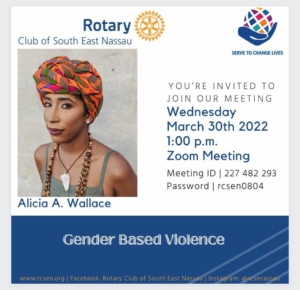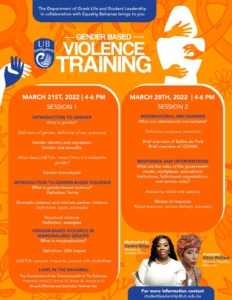In two days, it will be Women’s History Month, also known as International Women’s Month due to International Women’s Day being on the eighth. It is a time to not only acknowledge the work and achievements of women in the past, but to face the issues of the present in a way that can contribute to an equitable future.
We are still living in an inequitable, violent world that privileges men, boys, and the masculine and discriminates against women, girls, and the feminine. Misogyny and gender inequality are entrenched in the constitution, permeate our laws, and influence behaviour that is often conflated with culture and deemed unchangeable. Many people continue to ignore the existence of gender inequality and to insist that gender equality does not exist, while looking at and being a part of the evidence that it does, indeed, exist and is affecting all of us every day.
This week, I am participating in the World Conference on Stateless where people from all over the world are talking about stateless, the laws and conditions that lead to it, and the affect that it has on stateless people and broader society. In some of the sessions, the focus is on gender inequality in nationality rights, making it difficult or impossible for women to confer citizenship on their children and spouses.
Several people have made it a point to tell me that they did not know The Bahamas had this issue. They did not know that things were so bad in The Bahamas. I know that there are many Bahamians who would take great exception to this, feeling the need to defend The Bahamas and insist that it is not a bad place, or that its problems are not so terrible. This is easy to do when people do not face these problems themselves, and even moreso when they could not care less about the trials and tribulations of others —particularly those they already consider to be “other.” This, in fact, is evidence of the terrible state affairs. People do not even have the capacity to care about what is happening around them, to people around them, many of whom they depend on for various forms of labour.
Women’s History Month begins in two days, and I take this opportunity to share that my colleagues at Equality Bahamas and I have been requesting a meeting with the Minister of Social Services for months. In fact, we had been requesting a meeting with his predecessor for months as well.
It is unclear whether we have ministers who are incapable of meeting with feminist civil society organisations or ministries and departments that are staffed with people who are unwilling to do their jobs or see it as their duty to be the bottlenecks that frustrate so many into non-participation. Perhaps it is a combination of the two.
This is not only unfortunate, but to the detriment of the country which is struggling to present itself as doing all right, and a government desperate to hide its failures and sugarcoat its complete disinterest in meeting international human rights standards. Civil society organisations such as Equality Bahamas are advocating for women to have full access to our human rights by participating in and invoking international mechanisms, demanding legal reform, providing public education material, and engaging with community members. This often means its representatives provide written and oral accounts of what is taking place in The Bahamas, how the government is responding to issues, and how government officials engage with advocates and affected people. These reports, generally speaking, are not good. The failure of successive government administrations is colossal, embarrassing, and wholly unnecessary.
In 1993, the Government of The Bahamas ratified the Convention on the Elimination of All Forms of Discrimination against Women (CEDAW) and reserved on Articles 2(a) and 9(2) which obligate States to “embody the principle of the equality of men and women in their national constitutions or other appropriate legislation if not yet incorporated therein[…]” and to “grant women equal citizenship rights with men with respect to the nationality of their children”. The CEDAW Committee has, on more than one occasion, recommended that the Government of The Bahamas withdraw its reservations, stating that these Articles are integral to the intended effect of the Convention itself. In particular, to reserve on Article 2 is antithetical to CEDAW and the ratification of it. How can a government commit to eliminating discrimination against women, yet refuse to make the necessary changes in the law?
Does a government committed to gender equality have ministers with responsibility for the gender department who refuse to meet with women’s rights advocates? Does it employ people who refuse to coordinate meetings at the request of civil society organisations? Civil society in some countries, with much smaller civic space, often complain of being unable to engage with government except for when they meet in international spaces, particularly where reporting is done. This should not be the case in The Bahamas, especially when the government has told the Human Rights Council that it is unaware of hostility toward human rights defenders.
We have to demand more of the government. We barely get promises, much less action that moves us toward gender equality. Even ending gender-based violence is not a priority for this administration which has failed to pass the Gender-Based Violence bill and is pretending as though the marital rape bill has vanished into thin air.
It is not enough to make speeches in other parts of the world about its “commitment” to human rights, and it is unacceptable for it to overstate its plans and actions. Equality Bahamas invites members of the public — women and girls in particular — to join us in taking our feminist demands to the streets. Our International Women’s Day March and Expo is on Saturday, March 9. Meet us at the Eastern Parade at 8:45am for the march to The Dundas Centre for the Performing Arts on Mackey Street, then spend the day with us at the Expo with several none-governmental organisations and practitioners who will facilitate great sessions from Zumba and yoga to letterpress printing and an introduction to bush medicine. Learn more about the event at tiny.cc/iwd242nassau.
Published in The Tribune on February 28, 2024.




